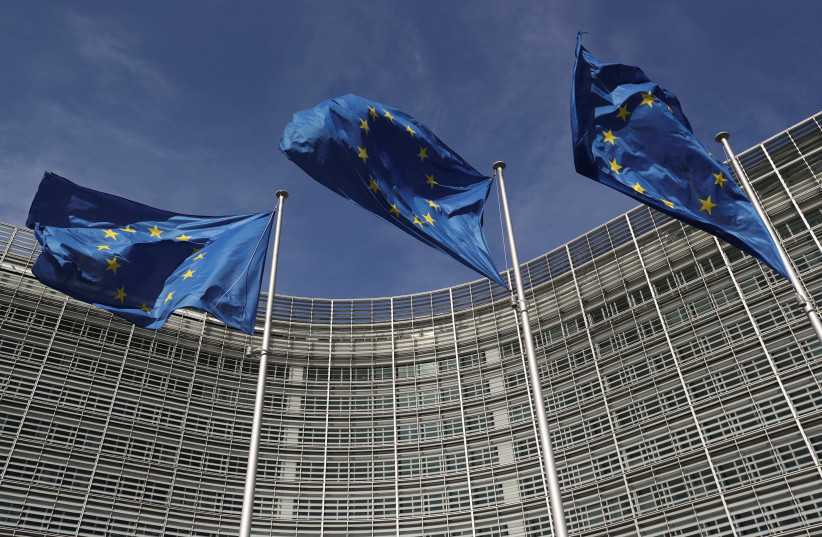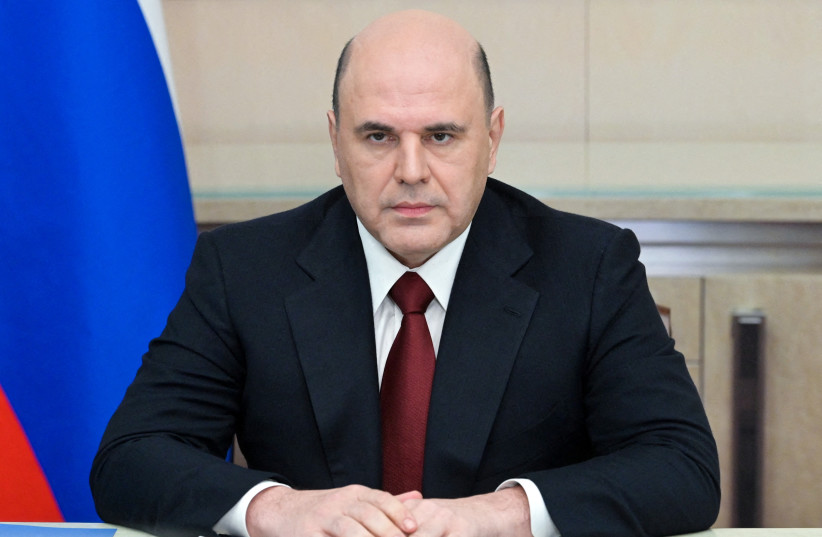Russia and Belarus have been suspended from the Organisation for Economic Co-operation and Development due to the Russian invasion of Ukraine.
OECD member states instructed the body's secretary-general to formulate plans to strengthen support for Ukraine, including measures to support its economy, as noted in a statement on the OECD website.
New EU sanctions on Russia and Belarus
The European Union on Wednesday agreed to extend the sanctions on Russia and Belarus, imposing them on 160 different individuals and amending regulations to make the sanctions on the two countries more aligned.
The reason for this, the EU said in a statement, is to ensure that Russia can't circumvent sanctions through Belarus.

This means that Belarus, like Russia, will also be cut off from the international SWIFT financial network.
Belarusian nationals or residents will no longer be able to make deposits exceeding €100,000 in the EU.
New restrictions will also be placed on Russia regarding the export of navigation and communication technology and sanctions on the Russian Maritime Register of Shipping.
Of the 160 individuals sanctioned, this includes 14 prominent oligarchs and family members and 146 politicians.
In total, EU sanctions against Russia now apply to 862 individuals and 53 entities.
Estonia's e-Residency
Estonia is also taking measures to prevent Russians and Belarusians from using the Baltic nation as a means of getting around sanctions.
The Baltic state has a unique policy known as e-Residency, which allows non-Estonian residents to access Estonian services such as banks, taxation, payments and more.
However, this will be suspended for Russians and Belarusians due to fears this might be used to get around sanctions.
No decisions on granting e-Residency for Russian and Belarusian nationals will be made until further notice, the Estonian e-Residency website said.
US sanctions batter Russia
The US has also placed numerous sanctions on Russia, which is currently estimated to be the most-sanctioned country in the world.
"We are enforcing the most significant package of economic sanctions in history, and it's causing significant damage to Russia's economy," US President Joe Biden was quoted as saying by the State Department, adding that "One ruble is now worth less than one American penny."
Germany and Sberbank
However, Germany has ensured that Russian majority-state-owned financial institution Sberbank not be cut out of SWIFT, Bloomberg reported.
Sberbank is Russia's largest bank and is estimated to hold around half of Russia's retail deposits. However, it has been kept connected to SWIFT due to the desires of Berlin - something in line with German Chancellor Olaf Scholz's recent calls for restraining any sanctions that could impact energy exports – which, he said, are of "essential importance" to Europe's economy, according to Bloomberg.
EU blacklists Aeroflot CEO
The European Union blacklisted the CEO of Russian airline Aeroflot, foreign minister Sergei Lavrov's son-in-law and more oligarchs in a fresh round of sanctions following Russia's invasion of Ukraine.
The Russian citizens sanctioned include Dmitrievich Pumpyansky, chairman of the board of directors of PJSC Pipe Metallurgical Company; Semenovich Vinokurov, who is married to Lavrov's daughter; Eduardovich Oseevsky, president of Russia’s largest provider of digital services; and Igorevich Poluboyarinov, CEO of Aeroflot, the EU's Official Journal said.
The measures come on top of a barrage of other sanctions imposed on Russia and Belarus for the invasion of Ukraine and aim to further increase pressure on the two countries' economies.
Russia's economy
Russian parliament committees are ready to introduce proposals to regulate prices for food, medicines and other goods, Interfax news agency reported on Wednesday, citing a ruling party lawmaker.
Alexander Khinshtein, a member of the United Russia Party, said such a legislative initiative has been already prepared by committees in the Duma and could be proposed "at any moment."
Grain
One area of the economy that Russia wants to fix is with grain.
Moscow must prioritize grain supplies to domestic bakeries over export markets, Prime Minister Mikhail Mishustin said on Wednesday as he unveiled fresh measures to support the domestic economy in the face of international sanctions over Ukraine.
Russia and Ukraine are both major wheat exporters, and the military conflict is threatening global grain production and the supply of edible oil and fertilizer exports, sending commodity prices rocketing and mirroring the crisis in energy markets.

"This is important to keep the food market in balance and we are closely monitoring prices for the most essential social goods such as food, including bread," Mishustin told a governmental meeting.
"Russian grain is in good demand from abroad and its price is increasing. That said, it is necessary to provide the necessary raw materials, first of all, to the domestic baking industry."
Mishustin did not say whether Russia would try and limit grain exports - a step which is likely to deepen the global food crisis and send wheat prices even higher - but added that a just started spring sowing campaign must continue "uninterrupted."
The government would provide agriculture producers with short-term loans under preferential rates worth over 160 billion roubles ($1.3 b.), so they have "everything needed for successful sowing campaign amid increased food demand on global markets."
Among other measures, Mishustin said that the government would cut taxes on light vehicles, allow some companies not to disclose their corporate documents and remove income tax on deposits. It would also try to help Russian airlines to keep their foreign fleets and retaliate against countries banning entrance Russian ships to their ports.
"Sanctions-linked turbulence will end, sooner or later," Mishustin said.
Egypt's supply minister Ali Moselhy said on Wednesday that production from Russia and Ukraine represented 32% of exportable wheat quantities globally.
Egypt, often the world's largest wheat buyer, had relied on Russian and Ukrainian grain for the majority of its wheat imports and has canceled two international purchasing tenders since Russia's invasion of Ukraine.
WarnerMedia, Sony turn off in Russia
AT&T's WarnerMedia announced it was suspending all planned business in Russia.
The company will cease all broadcasts in the country and halt all new license deals. Planned movie and video game releases have also been stopped.
Sony Corp's 6758.T game division Wednesday said it has suspended all software and hardware shipments to Russia, including its new racing game, Gran Turismo 7, as it joined a growing number of corporations calling for peace in Ukraine.
Sony Interactive Entertainment said it also would suspend operations of the PlayStation Store in Russia.
Sony Group also announced it made a $2 million donation to the United Nations High Commissioner for Refugees and Save the Children "to support the victims of this tragedy."
Tobacco firms pause investments
Philip Morris International Inc PM.N has suspended its planned investments in the Russian Federation, the cigarette maker said on Wednesday, and will scale down manufacturing operations in the country following Moscow's invasion of Ukraine.
The previously planned investments include new product launches as well as commercial, innovation and manufacturing investments.
The company, like many Western brands including McDonald's Corp MCD.N, is continuing to pay salaries to all its employees in Russia and Ukraine during this period.
Ukraine, where Philip Morris temporarily suspended its operations on February 25, accounted for less than 2% of its total net revenue in 2021, while Russia made up around 6%.
The company has one factory and nearly 1,300 employees in Ukraine and more than 3,200 workers in Russia.
UK-listed tobacco firm Imperial Brands Plc IMB.L has also suspended all operations in Russia, following international sanctions against the country.
Food chains
McDonald's Corp MCD.N said on Wednesday the temporary closure of its 847 stores in Russia will cost the fast-food chain about $50 million a month.
The company said on Tuesday it would temporarily close all of its restaurants in Russia including its iconic Pushkin Square location, increasing pressure on other global brands to pause operations in the country following the invasion.
Papa John's International Inc PZZA.O said in a regulatory disclosure on Wednesday that it could end up having to absorb the cost of $15.2 million of receivables associated with its master franchisee in Russia, which runs all of its 188 restaurants there.
Royalties from the franchisee made up less than 1% of Papa Johns total revenue in 2021, the company said.
The pizza chain also said Wednesday that it ceased all operational, marketing and business support to - and engagement with - the Russian market, and that it is not receiving any royalties from restaurants there. Its Russian franchisee owns and operates its own supply chain.
Also suspending operations in Russia is Starbucks and Yum! Brands, the latter of which owns the widely popular fast-food chains of KFC and Pizza Hut. The latter, however, applies to investments and outlets run directly by the company, rather than franchises.
There are around 1,000 KFCs and 50 Pizza Huts in Russia, nearly all of which are franchises, and as such they will remain operational. However, all profits from Yum! Brands' operations in Russia will be redirected to humanitarian efforts for the people of Ukraine, as noted in a company statement.
Despite this, US fast-food chain Burger King will continue operating in Russia and will even open some new locations in the country in 2022, according to TASS.
However, it will be redirecting its profits from the 800 locations in Russia to relief efforts, and will even provide Ukrainian refugees with $5 million in food vouchers, the Associated Press reported.
In terms of beverages, Coca-Cola, PepsiCo, Heineken, Carlsberg and Diageo - the world's preeminent alcohol giant behind iconic brands such as Guinness and Captain Morgan - have all pulled out of Russia, as noted by TASS.
American company Brown-Forman, producer of Jack Daniel's whiskey and Finlandia vodka, is also suspending its commercial operations in Russia.
Swiss chocolate-maker Lindt announced that it would stop all business activities temporarily in Russia, closing shops and stopping deliveries, the company said in a press release.
Hotels
Hilton Worldwide Holdings Inc HLT.N said on Wednesday it would suspend all new development activity in Russia and had closed its corporate offices in Moscow, following the invasion of Ukraine.
Hyatt Hotels H.N on Wednesday also announced its decision to suspend development activities and any new investments in Russia, effective immediately.
Nationalization plans
Russia's ruling party, United Russia, said on Wednesday that a government commission had approved the first step towards nationalizing assets of foreign firms that leave the country in the wake of economic sanctions over Ukraine.
The party added in a statement on the Telegram messaging app that the commission on lawmaking activity had supported a bill allowing for firms more than 25% owned by foreigners from "unfriendly states" to be put into external administration.
"This will prevent bankruptcy and save jobs," it said.
United Russia said according to the proposed bill that companies who had announced they were leaving Russia could refuse to go into administration if within five days they resumed activities or sold shares, providing that the business and employees remained.
Otherwise, a court would appoint a temporary administration for three months, after which the shares of the new organization would be put up for auction and the old one would be liquidated.
The Biden administration welcomes US companies who have stopped doing business in Russia in response to the country's invasion of Ukraine and would likely take steps if their assets were seized, White House spokeswoman Jen Psaki said on Wednesday.
